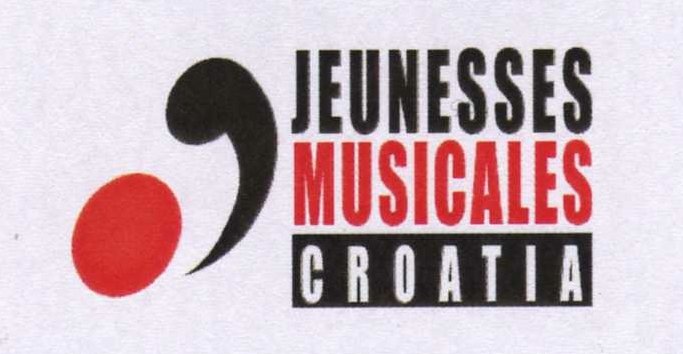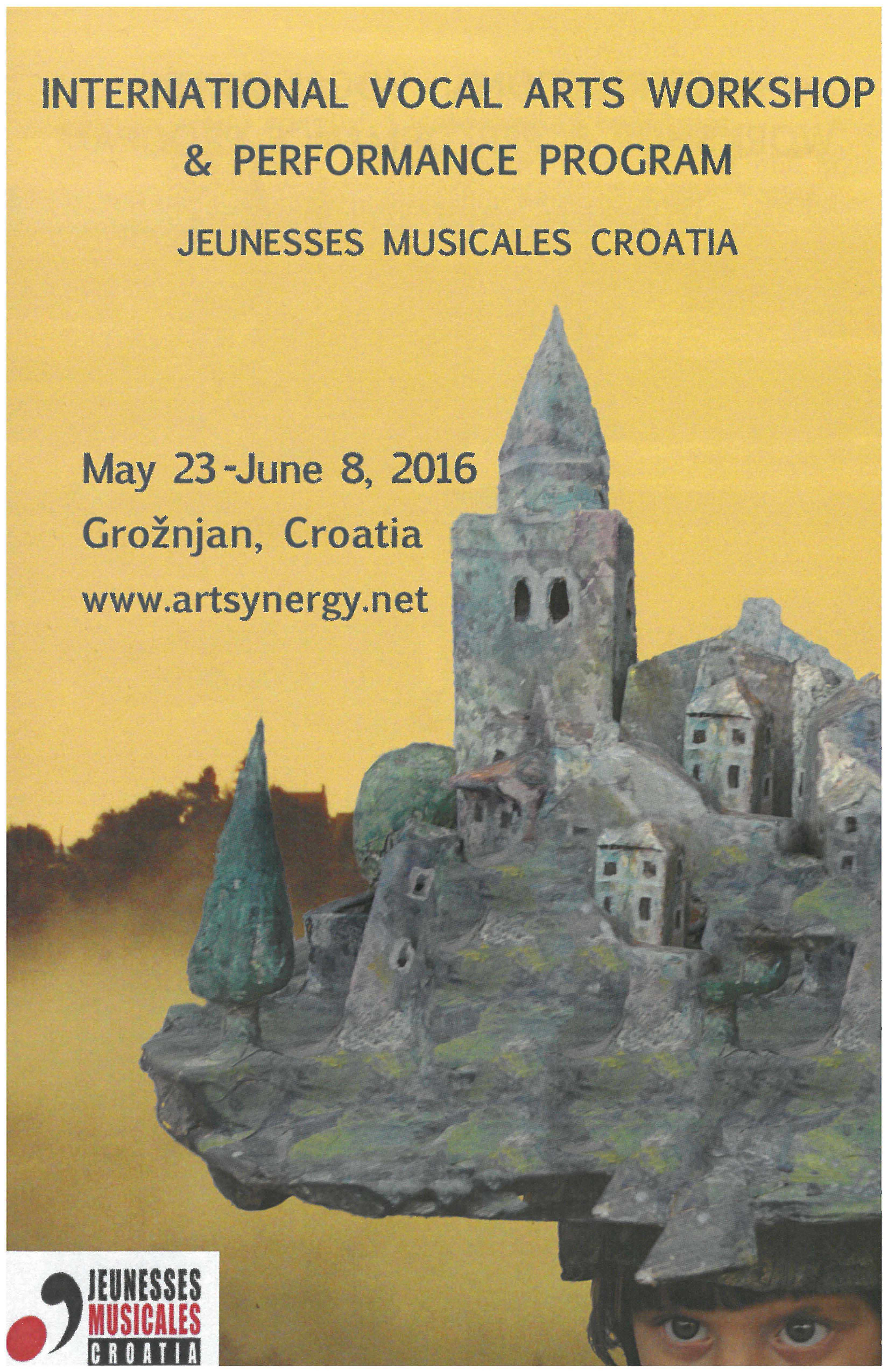|
Since the inception of the International Vocal Arts Workshop, a day has been devoted to a symposium in which students, performers, and scholars have presented papers, workshops, and discussions around a chosen theme of interest.
Symposium at the International Vocal Arts Workshop
Jeunesses Musicales Croatia, Grožnjan
29 May 2016
Performing the Other :: Interacting with the Unknown
Program (full program)
2:00 pm - Welcome
2:15pm - Papers
- Tanja Plešivčnik (University of Primorska, Koper, Slovenia)
- Facing, Feeling and Contemplating the Otherness
- Amy Olson (Teachers College, Columbia University, USA)
- 'The Other' and the Bilingual Education Debate in the United States
- Derek Rookhuizen (France)
- Same/Other and the Building Blocks that Link All Living Beings
- Kimmy Szeto (Baruch College, City University of New York, USA)
- Perceptions of Difference in Musical Works
3:30 pm - Reflections and Questions
4:00pm - Refreshments
4:30pm Presentations and Demonstrations
- Autumn Brown (USA)
- Attraction and Aversion in Performance
- Selena McMahan (France/USA)
- Performing With - And As - Another Species
- Carlos Pascual (Slovenia/USA/Mexico)
- The Self and Others : A Live Presentation
6:30pm - Refreshments
7:00pm - Presentations and Demonstrations
- Boris Magdalenc (Slovenia)
- Presentation of Hang : The Sound Sculpture
- International Vocal Arts Workshop
- Performance : A Showing of IVAW's Workshopping of Performing the Other
8:30pm - Dinner
* * *
Call for Proposals
Submit proposals of 300-500 words to Symposium Coordinator Kimmy Szeto at ivaw.groznjan@gmail.com by
Priority is given to submissions before
15 April 2016
Include a CV or a brief biographical note
This CFP is also available in Slovenian below and from regional representative Tanja Plešivčnik
Performing the Other :: Interacting with the Unknown
The image of the “Other” often calls forth attraction and a glorification of the exotic, along with the daring to explore and own the unknown. It can also evoke fear, distrust, even revulsion and hatred. Otherness is tightly intertwined with performance and education. It can determine how we see, how we learn, how we experience the world through our senses. We see Otherness in depictions of race, gender and sexual orientation, ethnicity, local affiliations, habits of our neighbors, in our relation to nature and environment. In this symposium, we will explore the many manifestations of Otherness in the performing arts, including cultural, sociological, pedagogical, aesthetic, technological, and historical aspects, as expressed in all the arts.
Issues to be explored may include:
- What does it mean to mediate the experience of the "Other" for an audience? What are the responsibilities of an intermediary? Whose perspective is prioritized?
- Does art require externalizing one's interiority in order to represent it to others? Is internalizing the "Other” an essential first step in this process?
- To perform is to go to “an other place.” How do musicians and artists negotiate the constantly migrating identities, styles, and contexts in their performing lives? How does exile, external or internal, relate to “Otherness”?
- The stranger, the migrant, the foreigner, call forth the idea of an “Other,” often with a negative aura: taboo, intolerance, fear, and frustration. How can “Performing the Other” instead stress commonalities?
In short, we welcome many viewpoints, from artists, critics, students, researchers, to help illuminate the subject. Proposals in the form of papers, presentations, workshops, and other interactive formats are welcome.
Je est un autre. (I is an Other.) —Rimbaud
And now, what’s going to happen to us without barbarians?
They were, those people, a kind of solution. —Cavafy
Decisions regarding the status of submitted proposals will be made and communicated via email as quickly as possible following the submission deadline, and certainly no later than 30 April.
Symposium topics in previous years
Playing in Time: Temporality in Performance and Performing Arts (2013)
Acousticity: A Symposium on Sound, Space, and Practice (2010)
Fluidity/Rigidity of Gender in Vocal Performance (2009)
External and Internal Influences on Vocal Forms and Styles (2008)
Traditional Structures in Contemporary Performance (2007)
Traditional Music and Theatre in Worldwide Performance (2006)
East European Traditional Music and Theatre in Performance (2005)
Uprizarjanje "drugosti"
Podoba "drugosti" v nas pogosto vzbudi privlačnost in poveličevanje eksotičnega, skupaj z drznostjo raziskovati in posedovati neznano. Lahko pa izzove tudi strah, nezaupanje ali celo odpor in sovraštvo. Drugost se tesno prepleta s performansom in vzgojo ter vpliva na našo percepcijo in razumevanje sveta. Zasledimo jo lahko v raznovrstnih reprezentacijah ras, spola in spolne usmeritve, etničnih in lokalnih pripadnosti, v dojemanju navad naših sosedov ter navsezadnje v našemu odnosu do narave in okolja. Simpozij je posvečen raziskovanju različnih manifestacij drugosti v performativnih umetnostih, vključujoč kulturne, družbene, pedagoške, estetske, tehnološke in zgodovinske vidike izražene v različnih umetniških praksah.
Predlagane teme:
- Kaj občinstvu pomeni posredovanje izkustva "drugosti"? Kakšne so odgovornosti posrednika? Čigava perspektiva je v tem procesu posredovanja prednostna?
- Ali reprezentacija v umetnosti zahteva pozunanjenje notranjosti nekoga? Ali je ponotranjenje "drugosti" ključno prvi korak v tem procesu?
- Uprizarjati pomeni zavzeti/oditi v neko "drugo mesto, drug prostor". Kako se glasbeniki in umetniki spopadajo s konstantnim seljenjem identitet, stilov in kontekstov skozi njihova performativna življenja? V kakšnem razmerju sta izgnanstvo, zunanje in notranje, ter "drugost"?
- Neznanec, migrant ali tujec pogosto prikliče idejo "drugosti"obdano s tabuji in negativnimi konotacijami, strahom, frustracijami in netoleranco. Kako lahko "uprizarjanje drugosti", nasprotno, poudari naše skupne značilnosti?
Odprti smo za različne poglede, umetnikov, kritikov, študentov in raziskovalcev, ki pomagajo osvetliti predmet razprave. Dobrodošli so prispevki v obliki seminarjev, predstavitev, delavnic in drugih interaktivnih formatov.
Je est un autre. (Jaz sem drug.) —Rimbaud
Και τώρα τι θα γένουμε χωρίς βαρβάρους. Οι άνθρωποι αυτοί ήσαν μια κάποια λύσις. (In sedaj, kaj se bo zgodilo nam brez barbarov? Ti ljudje so bili neke vrste rešitev.) —Cavafy
O sprejetju predloga boste obveščeni preko elektronske pošte, najkasneje do 30. aprila.
|


